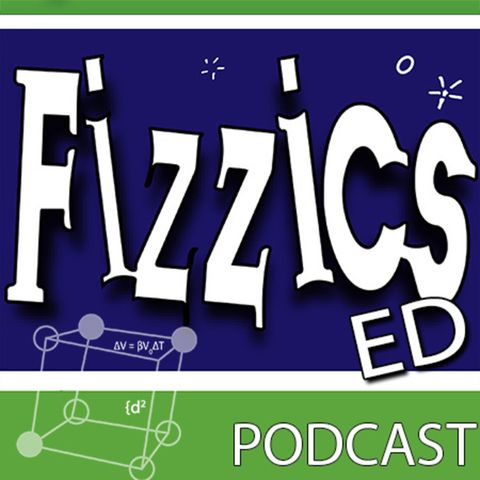Ep.1 Why establishing science clubs for preschoolers works

May 24, 2017 ·
49m 41s
Adam Selinger from the Children’s Discovery Museum in Wollongong discusses why establishing science clubs in libraries for children under 5 years old through the Little Bang Discovery Club has been...
show more
Adam Selinger from the Children’s Discovery Museum in Wollongong discusses why establishing science clubs in libraries for children under 5 years old through the Little Bang Discovery Club has been such a success. We also chat about the importance of allowing kids of all ages begin to guide their own learning and experience failures when exploring science experiments and maker space challenges.Hosted by Ben Newsome from Fizzics Education About Adam Selinger Adam Selinger has been involved in science education for over 25 years and is a co-founder and Creative Director of Children’s Discovery Museum, a non-profit educational charity. Combining a science degree from the Australian National University with work experience at Questacon (Australia’s National Science and technology Centre) Adam worked his way around the world participating in science centres and festivals in diverse places such as Canada, China, Indonesia, New Zealand, South Africa, the UK and the UAE. Highlights include performing science shows and managing the technical needs of hundreds of science presenters for the Edinburgh International Science Festival, producing Twilight Science teacher professional development programs, and staging MadLab electronics workshops around to regional South African schools. Following 10 years of concepts and piloting, Adam developed the initial design and learning experiences for the Early Start Discovery Space, Australia’s only example of a US-styled children’s museum. He is currently working on a national program to up-skill libraries and librarians to offer STEM programs from pre-schoolers and their adults, to youth and special interest. Top 3 learnings
Use librarians! They have so many resources that can be utilised for teaching STEM. Perhaps you can setup a corner or room with digital microscopes or science toys... or you could even create full blown maker space!
Embrace failure. Allow kids to fail during a science experiment; it's about exploring, discovering and refining!
Create student guided lessons in science. Allow children to have the free space for them to guide their own learning; can they modify their experiment to find out something unexpected?
Education tip of the week
Create creativity in your classroom! Give the students a broad challenge with a narrow timeframe whereby they have to create a solution for a given problem. This can be a Rube Goldberg machine, a marshmallow tower, boat floating challenge or any other challenge which gives them a problem where you remove as many boundaries as possible to them finding a solution. Further contact details for Adam Selinger Madlab: http://www.madlab.org/ Childrens Discovery Museum: https://www.childrensdiscovery.org.au/
Email: adam@madlab.org
STEM Teaching support resources NEW Primary STEM teaching book! http://www.fizzicseducation.com.au/be+amazing+book.html >100 Free Science Experiments http://www.fizzicseducation.com.au/Free+experiments.html >100 Free Science Ideas and Tips http://www.fizzicseducation.com.au/Blog.htmlContact Fizzics Education Web: http://www.fizzicseducation.com.au/ Phone: +612 9674 2191Know an educator who'd love this episode? Share it!If something grabbed your attention in this STEM podcast please leave your thoughts below.
show less
Use librarians! They have so many resources that can be utilised for teaching STEM. Perhaps you can setup a corner or room with digital microscopes or science toys... or you could even create full blown maker space!
Embrace failure. Allow kids to fail during a science experiment; it's about exploring, discovering and refining!
Create student guided lessons in science. Allow children to have the free space for them to guide their own learning; can they modify their experiment to find out something unexpected?
Education tip of the week
Create creativity in your classroom! Give the students a broad challenge with a narrow timeframe whereby they have to create a solution for a given problem. This can be a Rube Goldberg machine, a marshmallow tower, boat floating challenge or any other challenge which gives them a problem where you remove as many boundaries as possible to them finding a solution. Further contact details for Adam Selinger Madlab: http://www.madlab.org/ Childrens Discovery Museum: https://www.childrensdiscovery.org.au/
Email: adam@madlab.org
STEM Teaching support resources NEW Primary STEM teaching book! http://www.fizzicseducation.com.au/be+amazing+book.html >100 Free Science Experiments http://www.fizzicseducation.com.au/Free+experiments.html >100 Free Science Ideas and Tips http://www.fizzicseducation.com.au/Blog.htmlContact Fizzics Education Web: http://www.fizzicseducation.com.au/ Phone: +612 9674 2191Know an educator who'd love this episode? Share it!If something grabbed your attention in this STEM podcast please leave your thoughts below.
Information
| Author | Fizzics Education |
| Website | - |
| Tags |
Copyright 2024 - Spreaker Inc. an iHeartMedia Company
